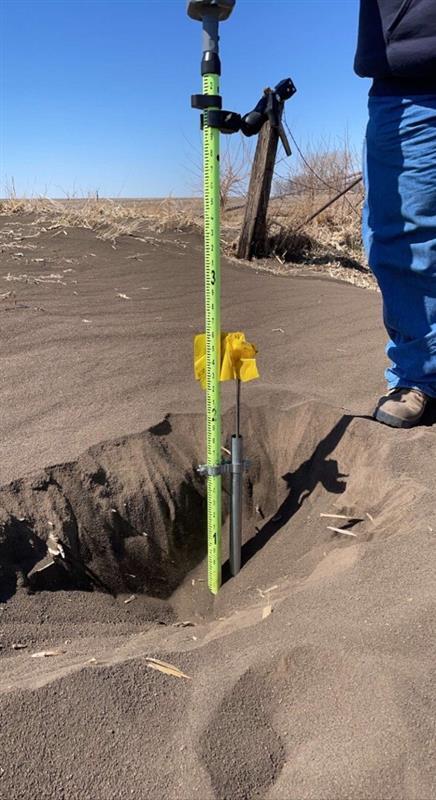April 2022 has been the second windiest April in recorded history, second by only a tight margin.
The intense winds we have all experienced impacted more than roofs, travel, and fires. Many
crop fields have lost inches of top soil to their neighbors and beyond. The photo at right was
taken in Lyon County and shows a drift entirely of dirt that stands nearly 2 feet tall and is
reminiscent of photos from the 1930’s Dust Bowl.
Soil is considered both a renewable and a nonrenewable resource because soil formation is continuously happening, but it happens at a rate that is so slow it

cannot keep up with the current rate of loss. To visualize: if a field is in compliance and only loses 5 tons/ac/year of topsoil (the thickness of a dime across the acre) in a quarter section, 160 acres, it amounts to 40 40’ side dump trucks full, over the course of the year. In this field, an estimated half inch has been lost across the quarter section which means 500 40’ side dumps have left this field. 500 dump trucks lined up together would stretch over 5 miles and reach from Bomgaars in Sheldon to the college and beyond.
Wind erosion happens in Iowa and windbreaks, living snow fences, and field borders help break the wind in the immediate vicinity, but do little to protect the soil surface in the middle of a section. Covering the soil is the best way to ensure it does not end up in the neighbor’s field or in the stratosphere with the clouds. Eliminating fall tillage allows a field to be more protected from the elements until spring plant comes around. Cover crops also help to hold the soil in place with the root systems they provide in the off season.
If you are interested in trying no‐till for the first time, stop by your local NRCS office
to talk about the State Funded No‐Till program that pays $10/ac up to 160 ac. You
must sign up before planting no‐till and funds are first come, first serve. If cover
crops are something you are interested in, State Funds are also available for first time
users at $25/ac and previous users at $15/ac up to 160 ac. Please feel free to call or
stop in any local NRCS office as our doors are now unlocked and appointments are no
longer needed.
Article Credit: NRCS's Northwest Prairies Resource Team